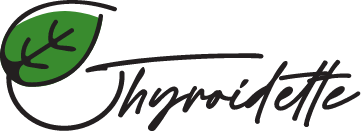Does Selenium cure the thyroid?
A lot has been written on Selenium and thyroid health. I will personally share that the first nutritional paper I ever read years ago (Gärtner et al., 2002), before studying nutrition academically, was actually on this topic. At the time this helped me alleviate a lot of my symptoms. More recently and by pure chance, I came upon a systematic review titled “Insufficient evidence to support the clinical efficacy of selenium supplementation for patients with chronic autoimmune thyroiditis”(Qiu et al., 2021). To keep my critical thinking skills active, I wanted to dive deeper in this one and see if using what I have learned since then while pursuing my Masters in Science and learning more on evidence-based practices, I will be able to find the faults in this article. My personal experience along with the countless articles that I have read since then and the nutrition classes I have taken tell me that selenium does have an effect. Boy am I surprised that after reading this article, I found myself somewhat agreeing with a lot of what Qiu et al. (2021) argue.
This was a very interesting read, because despite the title, Qiu et al. (2021) state a lot of what we already know. They present a lot of data on how selenium decreases antibody levels, and how this was found at different points in time in follow-ups from 3 to 12 months, what those trends are, and how those trends are different for those already on thyroid replacement and those who are not and are just trying the selenium. All those trends are positive and quite impressive, even if their analysis of the data found TSH was not affected. The paper presents a myriad of these positive findings, and only very briefly mentions some few reports of adverse effects such as stomach discomfort or nausea, and still the conclusion discourages the use of selenium because of the briefly mentioned effects. “Current evidence does not justify the emerging use of selenium supplementation in the treatment of [autoimmune thyroiditis], despite it resulting in a decrease in autoantibody levels.” (Qiu et al., 2021)
This was very frustrating to read. How could the analysis of obviously positive data be negative? A point to be made is that they analyzed 23 out of 3766 eligible papers, and it is not stated how they excluded so many, just that there was a strict restriction process. One thing the authors say is that they assessed the quality of evidence and bias using GRADE guidelines and Egger’s test and funnel plots. I don’t know what those are, but in their statistical analysis where they also assessed the power/weight of the studies, many of the evidence quality was deemed low.
Here is the valuable lesson I learned from this paper: Bio-individuality will always be key when building a client protocol, and as magical as selenium seems to be, there is no such thing as magic. We should not take it for granted when someone comes in with Hashimoto’s thyroiditis and start giving selenium, because that’s the protocol and all that have Hashimoto’s thyroiditis are all the same. Selenium alone will not do much. Something I did not know on Selenium’s thyroid antibody lowering effect is that that effect does not happen in the exact same way for all Hashimoto’s thyroiditis patients: “TPOAb levels seemed to be influenced by a polymorphism (r25191g/a, otherwise known as rs7579) within the human SEPP1 (SELENOP) gene [2]. It was reported that after 3 months of selenium supplementation, serum TPOAb titers tended to decrease more in patients with the AA genotype than in those with the GA or GG genotype, namely, by 46.2%, 14.5%, and 9.8%, respectively.”(Qiu et al., 2021). Simply put again, genetic factors influence how thyroid health is affected by selenium supplementation.
In addition, Qiu et al. (2021) find:” selenium supplementation showed no effect on the changeover of the hypothyroid trend. In addition, our meta-analysis for the effects on TSH levels reached the same conclusion.” I must admit that this is true for the study by Gärtner et al. (2002) who wrote: “Free T4 and T3 as well as TSH values were unchanged in both groups, and all were within the normal range.”. Yet before reading the recent review, I was not critical of this. Qiu et al. (2021) also found a significant risk of bias and problems with the study design in Gärtner et al. (2002).
I can appreciate Qiu et al.’s standpoint when I read the whole article. Though they do not say it explicitely, I find that this sort of paper encourages us to take a more comprehensive approach to nutrition. I find the information here valid and makes for a better understanding for selenium’s benefits. These benefits do not happen in a void and are limited, not all encompassing. I know personally that years ago when I started supplementing with selenium, I had already addressed my food intolerances months before. I am certain that if I had started with the selenium alone, I would not have noticed any changes. Any changes I noticed, I noticed before, and think that they were improved with selenium, but couldn’t that also be recall bias? Yes it could. But I also noticed that for 3 months when I had ran out and decided to take a break I started feeling a resurgance of some symptoms. Could this have been confounded by other factors, such as stress or the fact that those months were the very hot egyptian summer months? Always a possibility. So yes, plenty of scientific evidence exists on how selenium helps Hashimoto’s thyroiditis, and playing the devil’s advocate here still did not change my stance, but it did show the importance of digging deeper and addressing the root causes at the same time or before we look for a magic pill to fix everything.
I agree and do not agree with the last statement by Qiu et al. (2021) “routine selenium supplementation for [Hashimoto’s thyroiditis] patients should, at present, be discouraged”. Routine anything should be discouraged I feel. Nutritionists need to think critically and educate their clients on the importance of nutrient density and lifestyle factors. I don’t agree however that selenium is not useful. It could be useful if the context is right for it. Important things found in this very same review that could help us make better selenium recommendations: “dose of 200 μg… had better efficacy than doses of less than 200 μg… greater changes in autoantibody titers were seen with selenomethionine than with sodium selenite at the same dose of 200 μg (because of how different formulas are absorbed differently in the GI tract”(Qiu et al., 2021).
To find out more about thyroid health and nutrition, check out this guest blog post on Hashimoto’s and hypothyroidism.
References
Gärtner, R., Gasnier, B. C., Dietrich, J. W., Krebs, B., & Angstwurm, M. W. (2002, Apr). Selenium supplementation in patients with autoimmune thyroiditis decreases thyroid peroxidase antibodies concentrations. J Clin Endocrinol Metab, 87(4), 1687-1691. https://doi.org/10.1210/jcem.87.4.8421
Qiu, Y., Xing, Z., Xiang, Q., Yang, Q., Zhu, J., & Su, A. (2021, Aug). Insufficient evidence to support the clinical efficacy of selenium supplementation for patients with chronic autoimmune thyroiditis. Endocrine, 73(2), 384-397. https://doi.org/10.1007/s12020-021-02642-z



